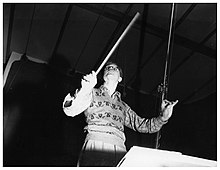Douglas Lilburn
Douglas Gordon Lilburn (born November 2, 1915 in Wanganui , † June 6, 2001 in Wellington ) was a New Zealand composer .
Life
Lilburn grew up on the Drysdale farm in New Zealand's North Island . After studying music in Christchurch (where he won a composition prize initiated by Percy Grainger in 1936 ), he studied composition at the Royal College of London, with Ralph Vaughan Williams among others . In 1940 Lilburn returned to New Zealand and settled in Christchurch. In 1947 he came to teach at Victoria College , now the Victoria University of Wellington . There he held a professorship from 1970. Lilburn was instrumental in building New Zealand's musical life.
plant
Lilburn's compositional style was initially strongly influenced by European late Romanticism . In the 1950s he also took up elements of twelve-tone music and serialism . After 1960 he hardly ever wrote works for conventional ensembles, but dealt almost exclusively with electronic music .
Works (selection)
- Forest (Tone Poem) (1936)
- Drysdale Overture (1937)
- Cantata "Prodigal Country" (1939)
- Festival Overture (1939)
- Aotearoa Overture (1940)
- A Song of Islands (Tone Poem) (1946)
- 3 symphonies (1949, 1951, 1961)
- numerous works for string orchestra
Web links
- Sound carrier by Douglas Lilburn in the catalog of the German National Library
- Douglas Lilburn . Lilburn Trust,accessed November 30, 2015.
- Douglas Lilburn - The Landscape of a New Zealand Composer . Archived from the original onOctober 14, 2008; accessed on November 30, 2015(English).
- Douglas Gordon Lilburn . Musicalics - The Classical Composers Database,accessed November 30, 2015.
| personal data | |
|---|---|
| SURNAME | Lilburn, Douglas |
| ALTERNATIVE NAMES | Lilburn, Douglas Gordon (full name) |
| BRIEF DESCRIPTION | New Zealand composer |
| DATE OF BIRTH | November 2, 1915 |
| PLACE OF BIRTH | Wanganui |
| DATE OF DEATH | June 6, 2001 |
| Place of death | Wellington |
